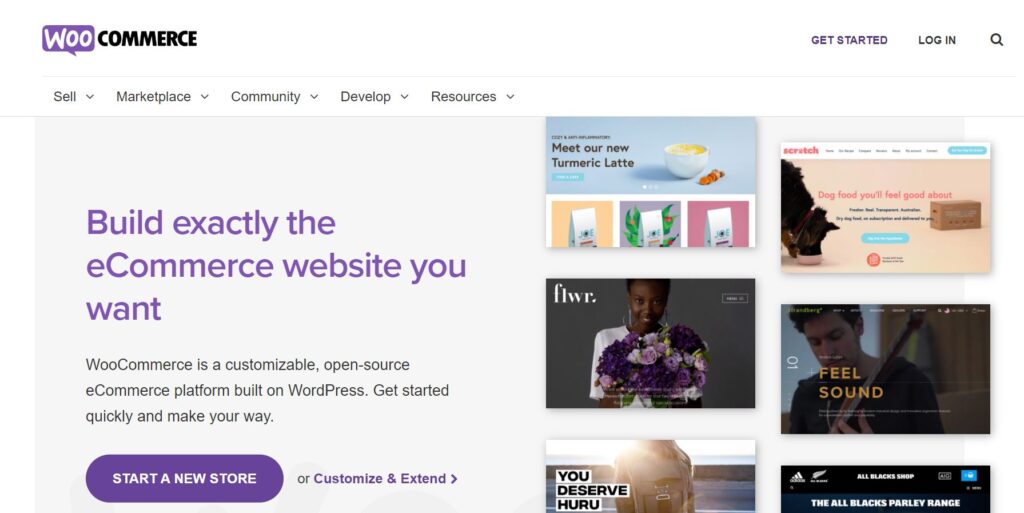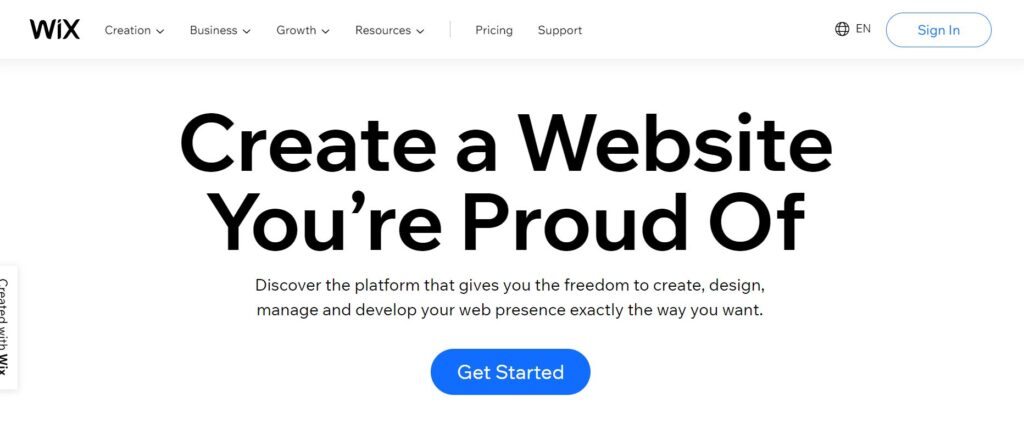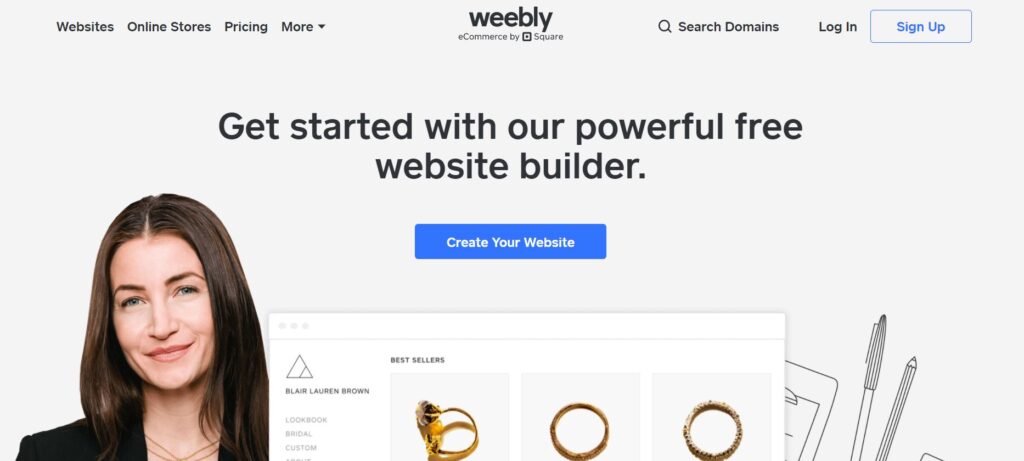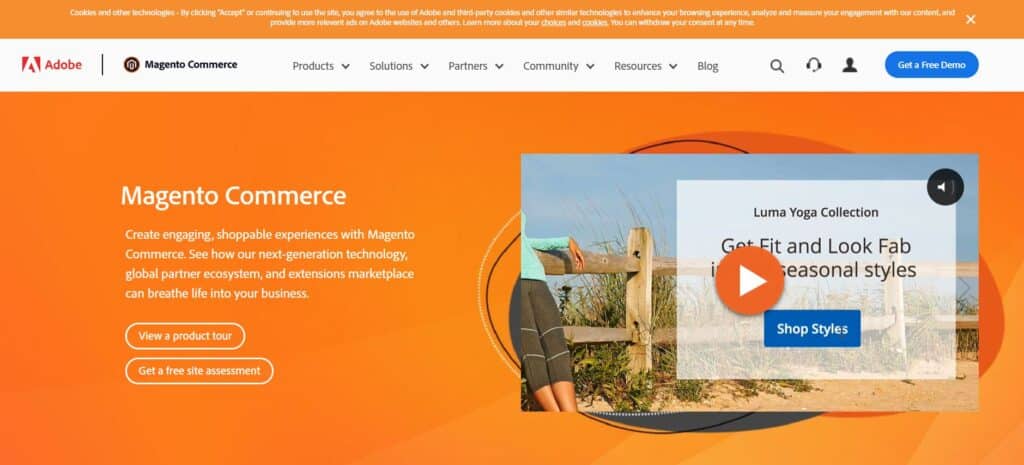An In-Depth Comparison of the Best E-Commerce Platforms
In order to have people visit your store and stay long enough to want to make a purchase, you will need the proper e-commerce platform. It’s not just about the look of your site, it’s also about the function and features available to you via various options.
Picking your e-commerce platform is a big decision and one that is going to have a long-term effect on your business going forward. It’s also a tough decision to make. Picking an e-commerce platform is kind of like picking a car, but don’t worry. Below is a list that will help you pick the best e-commerce platform for you and your business.
The Best E-commerce Platforms That Will Make You the Most Money
- WooCommerce
- Shopify
- Wix
- Weebly
- Squarespace
- Magento
1) WooCommerce
WooCommerce is a free, open-source WordPress shopping cart plugin. It is owned and developed by WordPress, so the credibility is high.
WordPress is best for small to medium businesses that already have a WordPress site, and/or want a robust online store.
It has many third-party themes and plugins, giving you a great deal of flexibility.
When it comes to using WooCommerce for the first time, there is a learning curve. Although it has a relatively straightforward install and set up, users have to develop their own expertise using forums and guides from WordPress. Once you have dipped your toes in, it becomes much easier to use. There are also many web developers who have this familiarity.
Pros:
- Is highly scalable and has low shop costs compared to other shop systems.
- Allows for a quick setup via WooCommerce-Wizard, knowledge in HTML and CSS not necessary.
- An endless variety of free and paid plugins and themes.
- There are a variety of connections to accounting systems, POS systems, and warehouse management systems.
Cons:
- It is not optimized for the German market. This means that if you want to tap into the German or European market, you will need another plugin from WordPress.
- It does not come with legal documents such as terms and conditions, privacy policy, cancellation policy, shipping policy etc.
- The update policy is dependent on the other plugins and the shop theme. If WooCommerce makes an update, you should not update your site immediately but instead test your shop thoroughly in a closed test environment. Because of the dependency on plugins, there can be massive problems with the shop.
Noteworthy Features:
- Thousands of extensions and themes available
- Multiple payment gateways
- Product management features
- Discount and coupon codes
- Includes great SEO options
WooCommerce is a preferred platform among developers, designers, marketers, and store owners. WooCommerce is your choice of platform if you already have a WordPress website, or have access to WordPress developers. Updating the store ongoing can be done by yourself or the developer.
2) Shopify
Shopify is one of the best e-commerce platforms for beginners with a tight budget. Everything you need is already integrated right into the platform. From storefront design to content marketing and performance metrics.
The learning curve for Shopify is easy for beginners. You have the ability to choose from a wide range of pre-existing design templates or create one yourself.
Shopify is great for business owners who need to set up an online store quickly and efficiently.
Pros:
- Very simple to use. It is a great platform if you are not tech-savvy.
- It has built-in speed and security for hosting. Shopify allows you to turn over speed and security to the pros and let them worry about hackers, caching compliance, and a whole range of issues that comes with hosting an online store.
- Shopify includes the basics for marketing your own business. Shopify allows you to easily create landing pages and marketing campaigns on top of SEO basics.
Cons:
- The pricing can be confusing, between the fees and subscriptions, it can be frustrating for business owners to figure out.
- Every e-commerce platform comes with a learning curve. Shopify has a steep learning curve, because of the jargon they use. The dashboard is not intuitive until you learn that it’s a business view and not an online store view.
Noteworthy Features:
- 24-hour support
- Unlimited product listings
- Real-time sales statistics
- Subscription-based service
- Multiple payment gateways
Shopify is a great choice if you want an all-in-one package for your e-commerce store that gets you up and running quickly with numerous features and apps. Shopify is best for small businesses.
3) Wix
Wix is a cloud-based website builder that allows you to create online stores through a drag and drop tool. It is one of the easiest platforms to use in terms of templates and designs.
Wix is best for small to medium-sized businesses that do not have access to a web designer. There are plenty of plugins to choose from, making it extremely customizable for businesses.
Pros:
- Wix has a great site speed, and your site is properly optimized by default. This means that hosting a Wix site is very simple.
- There is a drag and drop interface making it very easy to use and set up your site, with no prior knowledge.
- SEO management is a built-in feature. Wix also lets you modify the URL of each page to best fit what you need Google to know.
- You can create social media posts and email marketing right on the Wix site.
Cons:
- Wix templates are not interchangeable. This means that you cannot transfer content from one template to another.
- Tracking and analytics require a paid plan. In order to integrate Google Analytics with your Wix site, you must pay for it.
- Unfortunately, your Wix site is not transferable. If you have outgrown the capabilities of your Wix site, you will have to pay some serious money to recreate and transfer your website away from Wix.
Noteworthy Features:
- Ease of use
- Amazing designs
- Google analytics integration
- Basic customer management
- Built-in drop shipping
Wix is ideal for smaller professional websites. If you have the time and some skill, and not the financial resources, this DIY website builder could be for you. If you want high customization, however, this is not the platform to choose to work with.
4) Weebly
Weebly is one of the easiest ways to get a website up and running in less than an hour. It is one of the most recognized brands and continues to gain new customers every day.
Weebly is simple. It is a drag and drop system, giving you complete control over your customization and flow of your e-commerce website.
With Weebly, you have access to customizable webpage designs and useful tools to grow your business.
They offer a step-by-step guide on how to build and launch your website with expert planning tools.
Pros:
- Weebly has an extensive mobile app that allows you to edit your website directly from your phone. It offers users a drag and drop editor.
- Let's you manage complex backend tasks such as order processing, fulfillment, inventory check, accept payments, and so on.
- Besides the main feature of a free website builder, Weebly also offers you a free domain, free SEO reports, and is easy to upgrade at any point in time.
- There are many reasons why someone may want to move away from a service provider and Weebly makes it easy to move to a new platform like WordPress and WooCommerce.
Cons:
- Your help and support levels are based on which plan you have purchased.
- You will have to investigate third-party payment processors for your e-commerce site.
- There are limitations when adding in photos to your e-commerce site. You will have to use an offline photo editor before adding in your photos to your online store.
Noteworthy Features:
- Search engine optimization tools
- Customizable email templates
- Shipping tools for domestic and international products
- Inventory tracking
- Coupons and gift cards
Weebly has a low learning curve, so if you are looking to get your website up and running quickly by yourself, then this is a good choice. However, because it is a drag and drop system there is not a lot of customizations available.
5) Squarespace
Squarespace provides both website and e-commerce online building and hosting to its customers. It uses a drag-and-drop functionality with pre-built templates to create web pages for your store.
Squarespace is best for entrepreneurs and small businesses with basic e-commerce needs. Businesses with more advanced online retail requirements and who handle a large amount of inventory would not be a great fit for Squarespace.
It is amazingly simple to assemble and modify your e-commerce platform no matter your level of expertise. However, they are not many add-ons available in the default builder.
Pros:
- Squarespace is an all-in-one platform. Everything is Squarespace owned and developed. For example, website analytics is included within the platform.
- Squarespace hosts the websites build within their software. The cost of hosting is included in their monthly price. This approach ensures that your hosting is compatible and optimized while all the technical needs of hosting are taken care of by Squarespace.
Cons:
- There is no phone support with Squarespace. There is no way of receiving immediate support if there is an issue you need to troubleshoot.
- There is no support for third-party apps, plugins, or extensions. This makes it difficult for beginners to customize their e-commerce site.
Noteworthy Features:
- SEO tools
- Real-time shipping rates and tracking
- Upselling and cross-selling
- Automatic discounts
- Product import/export
Squarespace is another good option for those who are looking for a platform that is relatively easy to build themselves. If you do not have an IT or web development team, this is a good choice for you. One thing to consider is that it does not support more than 200 items in an online store.
6) Magento
Magento is one of the most popular open-source e-commerce platforms. This platform is best for small-to-medium-sized businesses that have already established demand, as well as the time, manpower, and skill in their own website.
Their platform has a library of over 5,000 extensions but requires a longer development time and a larger budget than most e-commerce platforms.
Magento does have a steep learning curve so you may need a dedicated team to work on your e-commerce site.
Pros:
- Magento is great for scalability. This platform allows you to start selling quickly from a simple shop and has the capability of growing into a robust online store. Their plans are designed to encourage this type of progression.
- It has a wide range of features that allows users to manage multiple stores and support multiple locations, languages, pricing, and currencies.
- It is mobile-friendly; it allows users to create a mobile site without any difficulty and gives you the best mobile viewing experience compared to other platforms.
Cons:
- Magento is very pricey. Large companies and online shops must purchase a very expensive solution plan to get started.
- Unlike other e-commerce sites, Magento customers must host their websites in hosting. Magento also does not manage domain registration.
- Magento is time-consuming because it has slow loading times. Customizations are difficult to make in comparison to other e-commerce platforms. It is also not easy to switch from one e-commerce site to another from Magento since it imports the data at a very slow rate.
Noteworthy Features:
- Integrated checkout, payment, and shipping
- Global selling
- Catalogue management
- Site search
- Mobile-optimized shopping
Magento is the best option for established retailers and business owners who have access to web developers with intermediate to advanced technical skills. If you are looking for a highly customizable site, this is your best option.
Final Thoughts
Choosing the right e-commerce platform is an important task. You will need the perfect platform for your business that gives you a great return on investment. Your online store is your customers' first impression, make this a good one by picking the proper site. Download our eBook to learn more about e-commerce.
Which one will you choose?
Having trouble deciding which platform is best for your business? It can be quite challenging to know what will work for you and what will not. At WEB ROI, we know the ins and outs of e-commerce platforms and specialize in transitioning clients to e-commerce.
Looking for help? Contact us today and gain insight on how to get the best return on investment for your business through e-commerce.
Download your FREE copy of 5 E-Commerce Roadblocks to Overcome and Speed Off to Sales.







